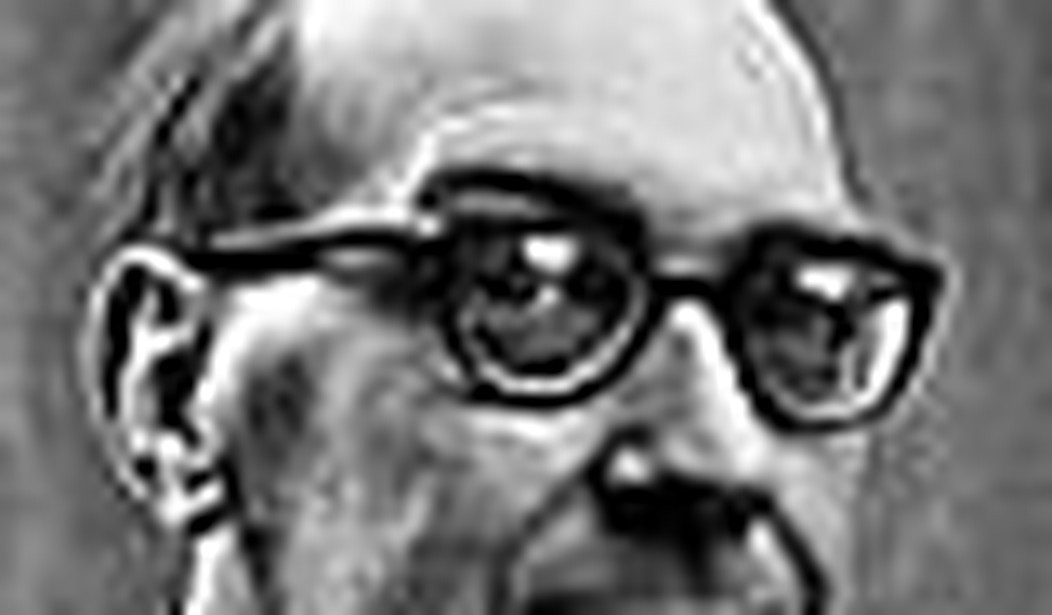Modern poets who are popular and first-rate, who are read by people who read poetry and by those who normally don’t, who are conservative but appeal to both Left and Right, and who write in traditional rhyme and meter rather than free verse, are, to put it mildly, rare and unusual beings.
Enter Philip Larkin, British subject, who died in 1985 at the age of 63. He was a contemporary of Ted Hughes (who married Sylvia Plath — ’nuff said), and Thom Gunn (who moved to San Francisco and became California’s poet laureate of motorbikes and gay bath houses). In Britain, where Larkin was named the greatest English writer (not just poet) of the post-war period, the 25th anniversary of his death is being treated as a very big deal. The question before the panel is: Why?
Here’s a theory. We are in difficult times and the common perception, fair or not, is that too many poets are disengaged from ordinary life. Not so Larkin, who told his publisher he hoped people would talk about his poems in pubs. Although he never pretended to be a “man of the people,” his poems rarely stray far from what most of us think and worry about. Such as:
- Sex (Other people having it, mostly): “High Windows.”
- Money (Should have invested better): “Money.”
- Work (The old 9-5): “Toads.”
- Unemployment (Dreaded): “Toads Revisited.”
- Faith (Not much — unfortunately): “Church Going.”
- Aging (Teenagers, thickening waistlines): “Afternoons.”
- Shopping (Women, clothes, dreams of romance): “The Large Cool Store.”
- Selfishness (No, I don’t want to come to your damn party): “Vers de Société.”
- Marriage (What do you say to someone you’ve lived with half your life that’s both honest and kind?): “Talking in Bed.”
- Screwing up big time (And ending up fucked): “Mr. Bleaney.”
- Modern world (Everything’s going to Hell): “Going, Going.”
- Love: (“In everyone there sleeps / A sense of life lived according to love”): “Faith Healing.”
- Death (And you thought Hannibal Lecter was scary): “Aubade.”
Another theory is Larkin’s ability to nail a subject (and his poems always have subjects), even when it’s as large as the mystery of life itself. Take the deliciously haunting “Days”:
What are days for? Days are where we live. They come, they wake us Time and time over. They are to be happy in: Where can we live but days? Ah, solving that question Brings the priest and the doctor In their long coats Running over the fields.
In life, Larkin ditched the priest and feared the doctor. Despite the realization that days “are to be happy in,” he wrote obsessively about Death, Disappointment, and Failure (his Three Muses). A lifelong bachelor (and not a handsome one, either), he left no heirs, no surprise when you consider the opening quatrain of his most infamous poem, “This Be the Verse.” Once you’ve read it a couple of times, it’s hard to get it out of your head.
They fuck you up, your mum and dad, They may not mean to, but they do. They fill you with the faults they had, And add some extra, just for you.
To say that Larkin saw the glass as half-empty would be an insult to his eyesight, even if he did wear prescription lenses so thick they looked like goggles strapped to a bald head. The glass was mostly a quarter full, and there must have been times when it was bone dry. His output was slim. Like the similarly frugal American poet Elizabeth Bishop — or to take a pop culture counterpart, Leonard Cohen — he was a perfectionist willing to slave over a poem for years before presenting it to the public.
But he had a profession, as university librarian at the University of Hull, a city in Yorkshire whose most obvious rhyme is — inescapably — “dull.” His was not a minor job (he was considered one of the best librarians in Britain), and it kept him from having to teach workshops, chase grants, and cozy up to powerful editors.
One of Larkin’s more famous pronouncements was that deprivation was to him what “daffodils were to Wordsworth.” The deprivation was both personal and, in a broader sense, public. Unlike his good friend the novelist Kingsley Amis, Larkin never married, never had kids, and was, in a lot of ways, what a friend of mine likes to call a real “Death-of-the-West-er” — i.e., a person who does not contribute to the propagation of the species. As you may have noticed in that list of his preferred topics, children don’t figure.
Although he managed to juggle several girlfriends for decades, sex, or its lack, was part of what he meant by “deprivation.” (“When I see a couple of kids / And guess he’s fucking her and she’s / Taking pills or wearing a diaphragm, / I know this is paradise / Everyone old has dreamed of all their lives,” he wrote in deliberately brutal fashion in 1967, when the sexual revolution sprung to life.)
But the deprivation was also social and political — a personal intuition of a spreading civilizational malaise. Larkin was a Conservative who adored Margaret Thatcher, mourned the destruction of England’s traditions and countryside, and lamented the death of her Empire. In the ironically titled “Homage to a Government,” he wrote:
Next year we are to bring the soldiers home For lack of money, and this is all right. Places they guarded, or kept orderly, Must guard themselves…
The poem concludes:
Our children will not know it’s a different country. All we can hope to leave them now is money.
The sense of mourning became even more acute in “Going, Going,” with its rage at the commercial destruction of the landscape: “And that will be England gone, / The shadows, the meadows, the lanes, / The guildhalls, the carved choirs /… All that remains for us / Will be concrete and tires.”
Despite being as un-American as they come, Larkin has a surprising number of American fans. (He once imagined a trendy American academic describing him as “one of those old-type natural fouled-up guys” — i.e., uptight, reactionary, and sexually repressed — all of which would be correct.) He wrote two lesbian novels under a fruity nom de plume (as well as two serious ones, Jill and A Girl in Winter) and had a lifelong addiction to masturbation and spanking magazines, all while suffering from a serious strain of anhedonia.
Yet Larkin was also a passionate admirer of New Orleans jazz and wrote a jazz column for the Daily Telegraph from 1961-1971, when he quit because he hated bebop and “free jazz,” just as he did abstract painting and other symptoms of what he believed was a widening and wrongheaded gulf between artist and audience. (As part of the anniversary celebrations, a four-CD box set called Larkin’s Jazz has just been released.) He also kept up life-long friendships not just with Amis but also with Robert Conquest, the poet and fearless anti-communist historian whose classic work, The Great Terror, was published four years before the advent of Solzhenitsyn’s The Gulag Archipelago.
He also expressed admiration for young interlopers like Bob Dylan, and had as much sympathy for society’s outcasts (“Nowhere to go but indoors, / No friends but empty chairs”) as any hobo-obsessed blues singer. He wrote deeply moving poems about love, nature, and even marriage. But the one emotion you will rarely if ever find expressed in his poems is unadulterated joy.
In a way that may appeal to Americans in particular, Larkin never put on airs or played at being the highbrow. He was as allergic to high-falutin’ poets like Wallace Stevens as much as to John Coltrane. He wrote about — and perhaps for — the middle classes with a tenderness and respect unusual in the world of poetry. Despite being a librarian and a poet, he pulled off the difficult trick of appearing not to be bookish (“Get stewed: Books are a load of crap”). What’s striking is that his poetry is as loved by experimental poets like John Ashbery as it is by those who prefer more conventional fare.
Larkin’s all-encompassing obsession was with death and the fear of death — in comparison, Woody Allen is a flyweight — which is why, despite his wan but heartfelt paeans to nature and the seasons (“The trees are coming into leaf / Like something almost being said”), he is a poet of endings rather than beginnings. Though he maintained a respect for religion (just about), Larkin had no personal faith to calm his fears.
“Most things never happen: this one will,” he wrote in “Aubade,” one of many, many poems about the “inevitable.” His terror was of course universal but also very much that of the contemporary agnostic or atheist — “total emptiness forever,” “sure extinction” — in an atomized world in which comfort is provided not necessarily by relatives or children but as often by white-coated nurses in vast, labyrinthine hospitals where body parts and diseases are apportioned entire wings and floors:
That is what we fear — no sight, no sound, No touch or taste or smell, nothing to think with, Nothing to love or link with, The anaesthetic from which none come round.
Long before cities filled up with “singletons,” Larkin was also a precursor and perhaps prophet of what is now a common mode of being in the West, namely the life deliberately led alone: “Thinking in terms of one / Is easily done — / One room, one bed, one chair, / One person there.” Yet solitude was necessary for the kind of poetry he wrote, and it happened to suit his temperament. Still, there is an undeniable ferocity, as well as humorous provocation, to the concluding stanza of “This Be The Verse” (“They fuck you up, your mum and dad…”). So much so, that in 1971 it was rejected as too shocking to publish by Britain’s left-wing political weekly, The New Statesman, where young turks such as Martin Amis and Christopher Hitchens were about to hang their hats:
Man hands on misery to man. It deepens like a coastal shelf. Get out as early as you can, And don’t have any kids yourself.(Audio of Larkin reading this poem here.)
The fact that the 25th anniversary of Larkin’s death is being celebrated in so festive a manner in Britain (more about that tomorrow) is slightly curious. Larkin memorialized life with a lyricism of austere loveliness, but he did so only in counterpoint to much more viscerally expressed fears of emptiness and mortality. He is the poet of faith’s final fade, of God’s disappearance into black holes and bleak interstellar spaces.
As he acknowledged in “Aubade,” “This is a special way of being afraid,” and for “special” I think we can read “modern.” To hear him read the 50 lines of this five-stanza poem, from its abrupt beginning (“I work all day and get half-drunk at night”) to its quiet end, is to experience poetry’s equivalent of being told by a doctor you have three months to live. You might want to sit down before listening.
In “Aubade,” Larkin looked death in the face with a courage few can muster. But there is no acceptance of death — Buddhist, Christian, what have you. There is only a very contemporary dread, one that he expressed in poem after poem. The denial of an afterlife, or even the possibility of one, is one of the bedrock beliefs of today’s intellectual class, and it has trickled down through society. Oddly, it may be why Larkin touches such a nerve, and has a dedicated readership far beyond that of most modern poets.
Tomorrow: Larkin on work and unemployment, and the curious celebrations of his life going on in England.









Join the conversation as a VIP Member